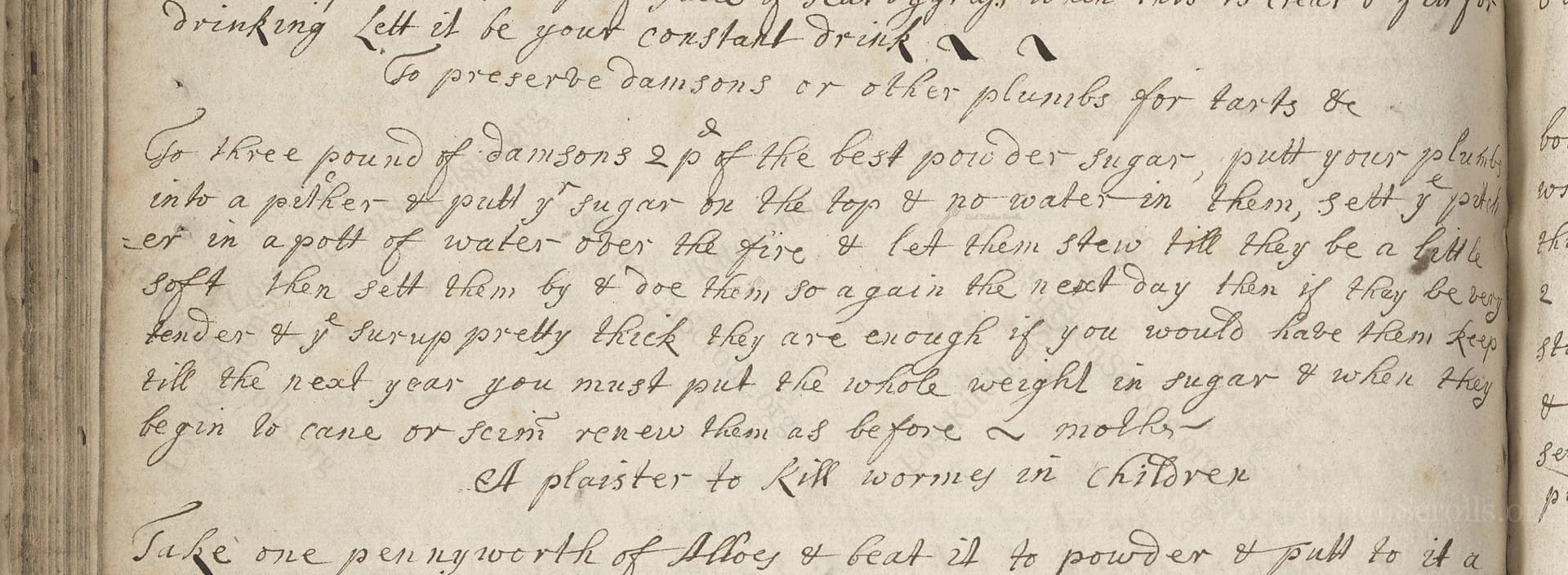
To Preserve Damsons Or Other Plumbs For Tarts &C
"To three pound of damsons 2 pound of the best powder sugar putt your plumbs into a potther & putt ye sugar on the topp & no water in them, sett ye pott over a soft fire & let them stew till they be a little tender & ye surrup pretty thick then sett them so again the next day then if they be very soft they are enough if you would have them keep till the next year you must putt the whole weight in sugar & when they begin to cane or scum renew them as before"
Note on the Original Text
This recipe is written in an early Modern English style, with spelling that reflects the period's lack of standardization ('plumbs', 'pott', 'sett', 'surrup'). Instructions are direct, assuming a certain level of kitchen skill and knowledge. Quantities and times tend to be approximate, relying on the cook’s experience to judge when the fruit and syrup are 'tender' and 'pretty thick.' The recipe also instructs on how to prevent spoilage by reheating if any scum or signs of fermentation appear—a nod to the realities of food preservation before reliable canning and refrigeration.

Title
Receipt book (1687)
You can also click the book image above to peruse the original tome
Writer
Unknown
Era
1687
Publisher
Unknown
Background
A charming culinary manuscript from the late 17th century, brimming with recipes that blend hearty tradition and a dash of Restoration-era flair. Perfect for those seeking a taste of historic feasts and flavorful ingenuity.
Kindly made available by
Folger Shakespeare Library
This recipe hails from the late 17th century, a period when sugar was both a luxury and a prized method for preserving seasonal fruit for enjoyment throughout the year. Recipes like this were often handwritten in family recipe books, passed from generation to generation as culinary heirlooms. Damsons and plums were popular fruits for preserving due to their natural tartness, which complemented the sweetness of sugar. Such preserves were essential not only as sweet treats but as important ingredients for tarts and other puddings during the winter months, when fresh fruit was scarce.

Back in the 1600s, cooks used earthenware or pottery pots for gentle cooking over a hearth or open flame. The 'soft fire' mentioned refers to placing the pot over glowing embers rather than a fierce heat. Large wooden spoons or paddles were used for stirring, while preserving would be done in ceramic or glass jars, sometimes sealed with parchment and bladder or wax. Tongs or wooden pokers helped manage pots in and out of the fire. No specialized sugar thermometers were available; the cook judged readiness by look and feel.
Prep Time
15 mins
Cook Time
1 hr 30 mins
Servings
12
We've done our best to adapt this historical recipe for modern kitchens, but some details may still need refinement. We warmly welcome feedback from fellow cooks and culinary historians — your insights support the entire community!
Ingredients
- 3 lbs damsons (or substitute with small plums)
- 2 lbs granulated sugar (white sugar, or caster sugar)
- Optionally, 3 lbs sugar if preserving for long-term storage
Instructions
- To make preserved damsons (or other plums) suitable for tarts and desserts: Weigh out 3 lbs damsons and 2 lbs of high-quality granulated sugar.
- Place the damsons in a heavy-based saucepan or Dutch oven, then sprinkle the sugar evenly over the top.
- Do not add any water.
- Set the pot over a low heat and allow the fruit to gently stew until tender and a thick syrup forms—this may take 30-45 minutes.
- Alow to cool, cover, and leave overnight.
- The next day, reheat gently without stirrring until the fruit is very soft and the syrup thickens further.
- If you wish to preserve the fruit for up to a year, use equal weights of sugar and damsons (3 lbs each).
- Store in sterilized jars, covering the fruit completely with syrup.
- Occasionally check for spoilage (such as fermentation or mold); if any forms, reheat the preserves as before.
Estimated Calories
150 per serving
Cooking Estimates
You will need about 15 minutes to prepare the damsons and sugar, and about 1 hour and 30 minutes total cooking time over two days. Each serving contains around 150 calories, and the recipe makes about 12 servings.
As noted above, we have made our best effort to translate and adapt this historical recipe for modern kitchens, taking into account ingredients nowadays, cooking techniques, measurements, and so on. However, historical recipes often contain assumptions that require interpretation.
We'd love for anyone to help improve these adaptations. Community contributions are highly welcome. If you have suggestions, corrections, or cooking tips based on your experience with this recipe, please share them below.
Join the Discussion
Rate This Recipe
Dietary Preference
Main Ingredients
Culinary Technique

Den Bockfisch In Einer Fleisch Suppen Zu Kochen
This recipe hails from a German manuscript cookbook compiled in 1696, a time whe...

Die Grieß Nudlen Zumachen
This recipe comes from a rather mysterious manuscript cookbook, penned anonymous...

Ein Boudain
This recipe comes from an anonymous German-language manuscript cookbook from 169...

Ein Gesaltzen Citroni
This recipe, dating from 1696, comes from an extensive anonymous German cookbook...
Browse our complete collection of time-honored recipes



